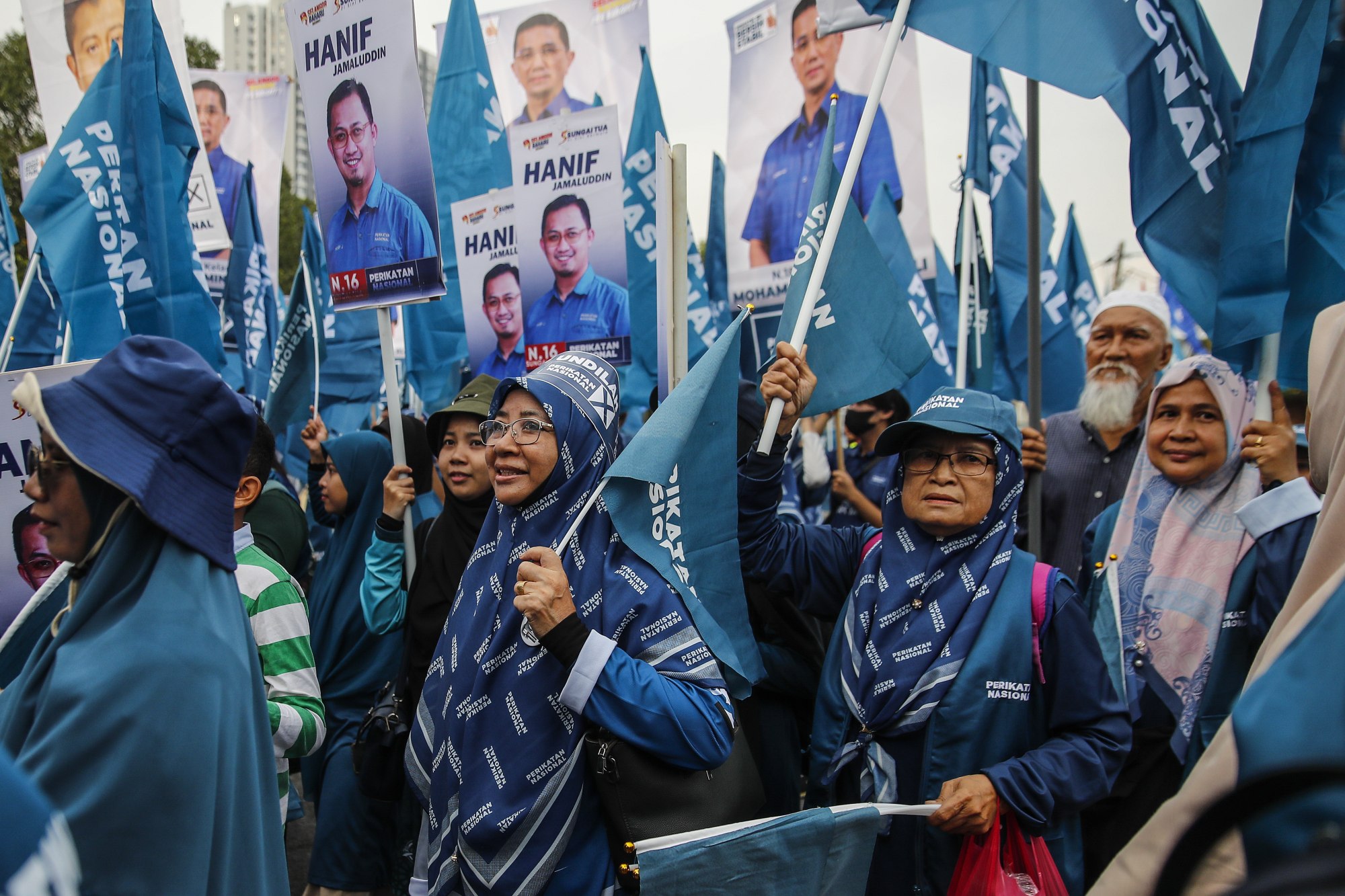
Malaysia state polls shut after day of low turnout
- PM Anwar Ibrahim is hoping the Malay-Muslim majority has not deserted his unity government, even as the opposition Perikatan Nasional gains ground in voter outreach
- Analysts forecast a low turnout will deliver a bloody nose to Anwar’s administration
Polls closed in six Malaysian states on Saturday with expectations a tepid turnout will be felt keenest by Prime Minister Anwar Ibrahim and his unity government, after a campaign where the opposition cast him as neglectful of the Malay-Muslim majority.
Around 9.7 million people were eligible to vote to choose the next governments for the six states – the Perikatan Nasional (PN) opposition-held Kedah, Kelantan and Terengganu in the North, and Negeri Sembilan, Penang and Selangor, where the government parties of the Pakatan Harapan (PH) dominated coalition hold sway.
The results of the state contests will have little direct bearing on Anwar’s hold on federal power. But they are seen as a barometer of support for him and his rag-tag administration of political allies and former foes, among the Malays who made a significant shift towards the Malay nationalist PN in last November’s general election, as well as his party faithful uncomfortable with his partners in government.
The Election Commission pointed to between 56-68 per cent turnout with just two hours of voting to go, as politicians from all sides called on the electorate to vote.
Only Terengganu appeared to have hit the 70 per cent mark by that time, still far short of official estimates of a nationwide 85 per cent turnout.
“Through your vote we choose leaders who will represent us,” PAS President Abdul Hadi Awang told reporters in an entreaty to vote halfway through the day shared on his official Facebook page.
“This is a big responsibility, so do not take this lightly, especially for the Muslims.”
Malaysia charges opposition election chief with sedition weeks before polls
PN has targeted that Malay base in its campaign strategy, with TikTok a key tool in its outreach to voters in Malay heartland areas, where Islamist party PAS – a key coalition member – has whipped up culture wars and sold a story of Malay neglect by Anwar’s administration.
Those areas have been especially hard hit by soaring living costs and persistent inflation.
But the message may have cut through outside the PN base.
In Rawang, on the fringe between Selangor’s highly urbanised centre and its more rural hinterlands, roadside food seller Zulkifli Che Ani indicated his vote was going to PN.
“Let’s go for change this round,” he said.
Meanwhile, in Kelantan, octogenarian Saleha Mustopa was appalled by the choice of candidates, questioning why Barisan Nasional (BN) is not on the ballot, and is voting instead for Islamist party PAS.
“I don’t like Anwar Ibrahim,” she said when asked why.

Anwar had been at the forefront of his administration’s efforts to turn the tide of Malay support in their favour, criss-crossing the country to reach as many Malay-majority areas as possible.
But experts say the unspectacular turnout may deliver his administration a bloody nose.
“Generally, lower turnout favours PN. This will impact PH”, said political analyst Bridget Welsh, adding that turnout from youth voters has “been low”.
She attributed the turnout level to voter apathy and dissatisfaction with the incumbent as well as an unwillingness to vote for the alternatives – the monoethnic PN coalition and the untested Muda party.
Even those more commonly in Anwar’s corner appeared uninspired by the sudan marriage between erstwhile enemies inside his coalition.
Following decades of animosity between BN and PH, many online cited this as a real issue among party supporters at the grass roots level, despite warming relations between the two former nemesis at their leadership level.
“Seeing tweets of PH & BN voters feeling conflicted having to vote each others candidate,” said Azman Abdullah on X, the platform formerly called Twitter.
Research firm Ilham Centre on Thursday released the findings of a July survey, said just one in four Malays among over 2,400 respondents said they were satisfied with the prime minister’s performance.
PN is hoping its social media campaign may have made the desired inroads into public opinion.
A recent TikTok live session featuring the controversial chief minister of Kedah, Muhammad Sanusi Md Nor, and political commentator Wan Muhammad Azri Wan Deris – better known as Papagomo – drew more than 62,000 views and 16 million likes.
Muhammad Sanusi on Thursday said voters are well acquainted with the “true face” of Anwar, who he said had made countless lofty promises for over two decades to better the lot of all Malaysians.
“For twenty-five years he was begging to be made PM. After he was given the mandate, eight months later nothing has happened,” Muhammad Sanusi said at a youth gathering in Kedah.
“These six states will become a referendum, a sign … for ‘Papa Non’ and his lackeys to pack up their things in Putrajaya,” he said in a TikTok video of his campaign speech, referring to Anwar and the administrative capital of Putrajaya.
Malay voters may seek a new platform to represent their identity politics after roundly rejecting former ruling party and BN linchpin Umno in the November polls, experts say.
Despite finishing with just 28 seats, Umno managed to find a way back into government after the king picked Anwar for the top job, on condition that he form a unity government that included both his political allies and adversaries.


